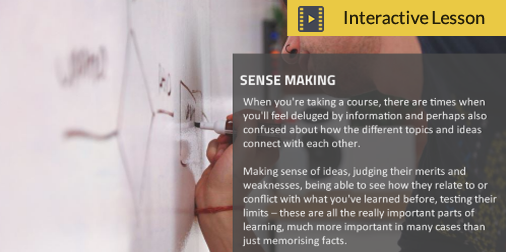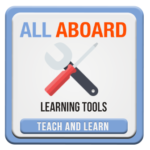Tools for Learning
How can we use technology to help us learn?
Content & learning objectives
Technology can often be a distraction when we’re trying to learn, trying to concentrate and focus on making sense of new information, new ideas. But, there are also ways in which technology can be used to help us organise our study and begin to understand key ideas.
In this online lesson, you will discover a number of example approaches that you can take to make your learning more effective, more structured: a mixture of techniques and technologies, apps and strategies, devices and resources.
To start the lesson, just click on the image and work your way through each of the topics. If you successfully complete the activities and the quiz, you can earn a digital badge.
Resources for learners, trainers, and developers
Are there badges available for this topic?
How can we run a workshop or classroom session on this topic?
Many institutions provide comprehensive training or even formal courses on aspects of studying, time management, and presentation skills. An additional approach that can be helpful is to showcase the range of apps and tools in demonstration sessions, and also raising awareness of what tools and apps are particularly recommended or made available under a licensing scheme to students in each discipline.
Are there resources and materials available?
Yes. We have collated some useful links for you (opposite) but you will also find many other sources of advice and guidance on the Web. Your Library or other study skills support service will also have resources that are worth accessing and browsing.
Can I download a copy of this interactive lesson?
Yes. We provide all the materials which we have developed (or adapted, subject to licence permissions) for use under a CC BY-NC 4.0 licence. A SCORM package for download will be available shortly.
Further information & useful links:
Wikipedia entry on concept maps: https://en.wikipedia.org/wiki/Concept_map
‘How People Learn’, major book summarising (in accessible language) research findings: https://www.nap.edu/catalog/9853/how-people-learn-brain-mind-experience-and-school-expanded-edition
Futurelearn Open Courses on aspects of Studying & Teaching: https://www.futurelearn.com/courses/categories/teaching-and-studying
Free mind mapping software (Freemind): http://freemind.sourceforge.net/wiki/index.php/Main_Page
Student Success Toolbox (project to support flexible learners, funded by the National Forum for the Enhancement of Teaching & Learning): http://studentsuccess.ie/the-toolbox/
‘Skills4studyCampus’ a set of online lessons and resources on study skills, from Palgrave Macmillan Publishers: http://www.skills4studycampus.com/palgrave/
For those interested on the research into students’ approaches to study, this project site has many useful papers and reports: http://www.etl.tla.ed.ac.uk/publications.html


